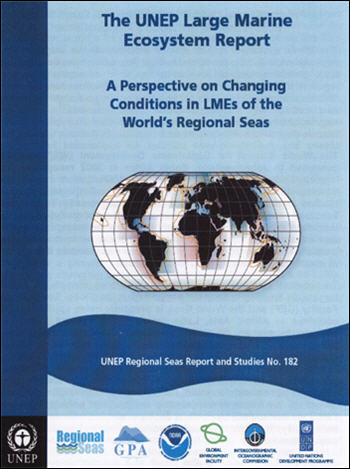The UNEP Large Marine Ecosystem Report
A Perspective on Changing Conditions in LMEs of the World's Regional Seas
The world's coastal ocean waters continue to be degraded by unsustainable fishing practices, habitat degradation, eutrophication, toxic pollution, aerosol contamination, and emerging diseases. Against this background is a growing recognition among world leaders that positive actions are required on the part of governments and civil society to redress global environmental and resource degradation with actions to recover depleted fish populations, restore degraded habitats and reduce coastal pollution.
No single international organization has been empowered to monitor and assess the changing states of coastal ecosystems on a global scale, and to reconcile the needs of individual nations to those of the community of nations for taking appropriate mitigation and management actions.
This report is a result of a collaborative effort to promote a global view of conditions within LMEs across the North-South divide. It was generously coordinated by UNEP Regional Seas Programme, and the Global Programme of Action for the Protection of the Marine Environment from Land-based Activities (GPA Coordination Office) in The Hague, Netherlands. In summer 2005 it was agreed that UNEP, in partnership with the GEFsupported Global International Waters Assessment (GIWA) project, and NOAA's Large Marine Ecosystem Program, would provide synopses of ecological conditions for each of the worlds' Large Marine Ecosystems (LMEs). In accordance with the outcome of a series of consultations among the three parties, it was concluded that the five-module LME assessment framework of productivity, fish and fisheries, pollution and ecosystem health, socioeconomics, and governance, would provide a useful basis for describing ecological conditions within the world's LMEs.
View the table of contents.
Download the full UNEP LME Report. 872 pages, 100Mb.

